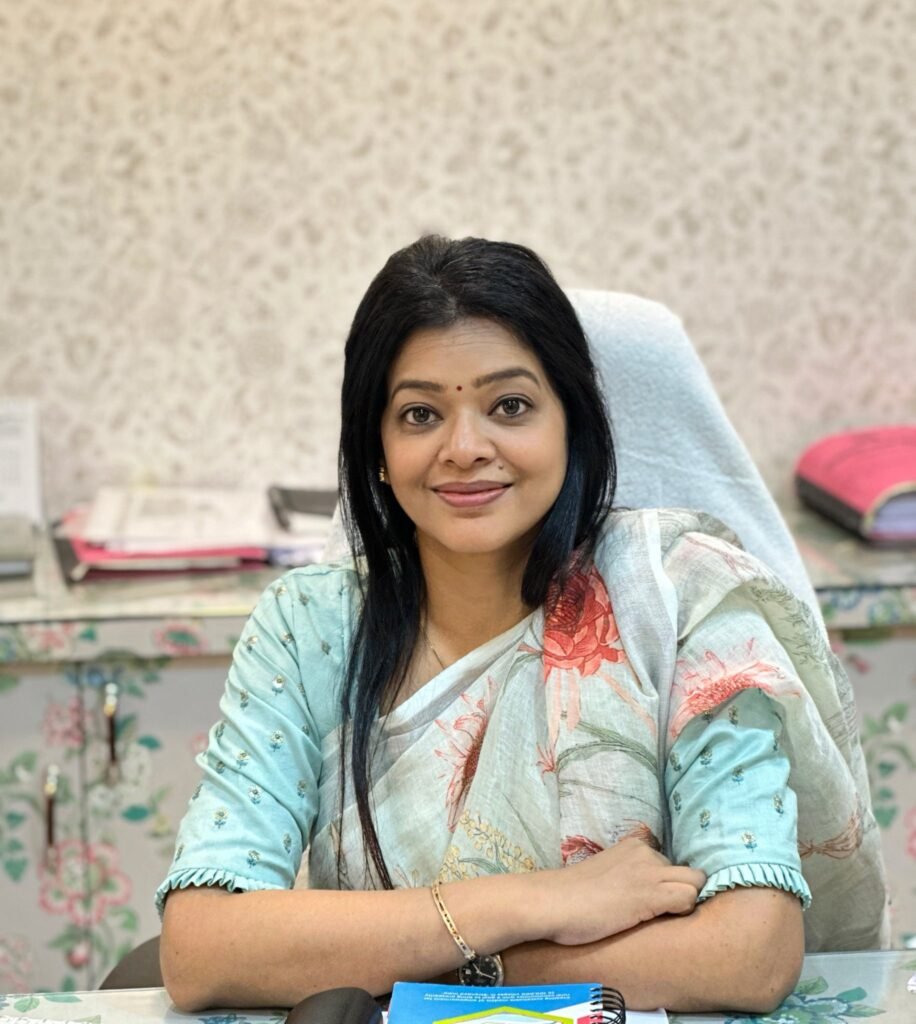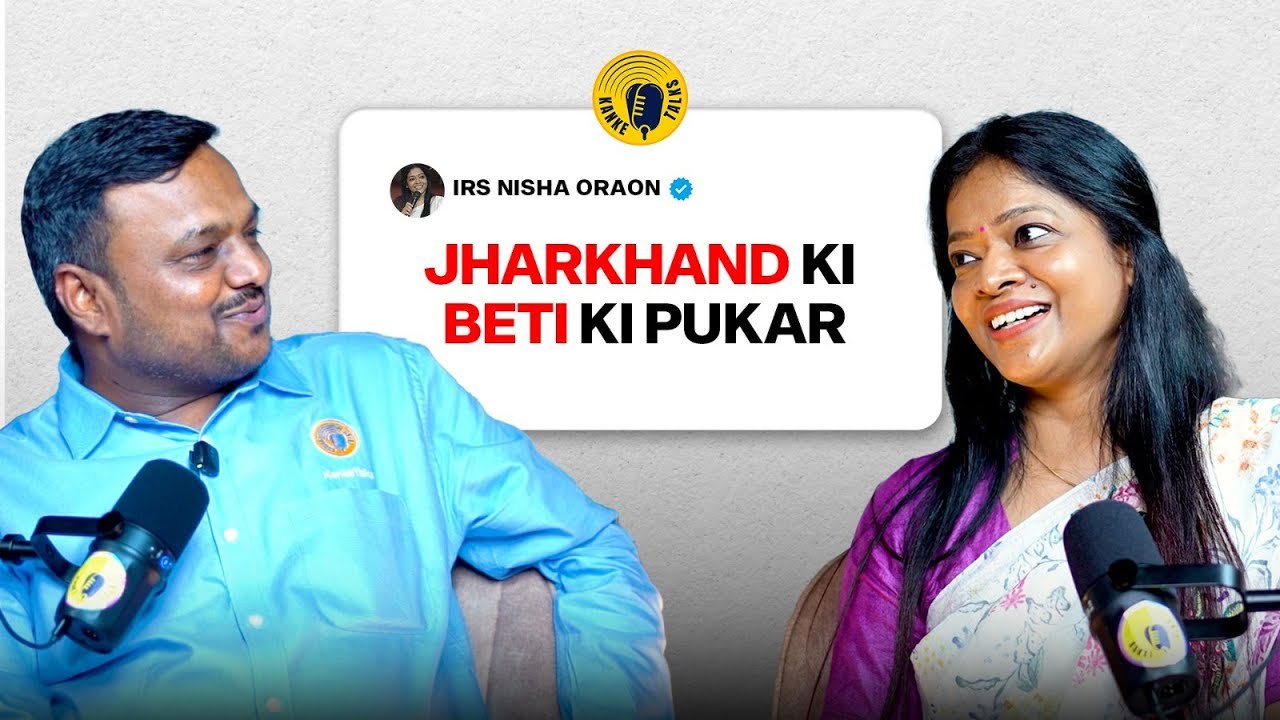Because every story deserves to be told.
Twenty-five years ago, the state of Jharkhand was carved out of Bihar with the hope of shaping its own destiny—a land rich in minerals, forests, and cultural vibrancy. But as the dust of separation settled, dreams were replaced with dilemmas. Where was the progress?
Chhattisgarh, born in the same year, seemed to surge ahead while Jharkhand struggled to find its footing.
In this landscape of expectations and accountability emerged a voice—not just from within the soil of Jharkhand, but deeply rooted in its spirit. A woman. A daughter. A revolutionary officer. Meet IRS officer Nesha Oraon, daughter of Hon’ble Minister Dr. Rameshwar Oraon, who chose to be defined not by privilege but by purpose.

Childhood in the Shadow of Service
Nesha grew up in a world where law and discipline were not just words—they were the atmosphere of her home. Her father, then an IPS officer, had a towering presence, not just in uniform but in values. “Our childhood was safe and deeply influenced by his work ethic,” she recalls. Watching her father lead with dedication sowed the first seeds of her aspiration. But unlike most daughters who mimic their fathers, Nesha wanted to walk beside him—not behind.
In a world where tribal children often grappled with discrimination and lack of access, Nesha’s early life was a cushion, yes, but it wasn’t blind to the realities of society. “To say I never faced discrimination would be a lie,” she admits. But rather than letting it embitter her, it strengthened her resolve to change the system from within.
Becoming the Dream
Engineering from BIT Mesra wasn’t just a degree—it was an internal battle. “I knew from the beginning that I didn’t want to pursue engineering, but I also knew I needed a strong academic foundation for UPSC,” she says. Even in a campus dominated by boys and strict academic rigour, Nisha stayed focused, though her heart beat to the rhythm of civil service.
Her journey to Delhi for UPSC preparation was anything but easy. “Delhi is tough. The pressure, the competition, the tiny rented rooms—it breaks you before it makes you,” she says, recalling the 12-hour study days and isolation. Her first attempt was fraught with missteps—choosing
Physics and Electrical Engineering as optional subjects proved too difficult. But as she shifted to Arts, she found not just a subject but a second chance.
“I developed a deep respect for Arts. It unlocked a creative, societal, and emotional side in me that engineering never could,” she reflects.
Cracking the Code—And a Love Story
In 2008, her hard work bore fruit. She cracked the UPSC. But success wasn’t the only thing she found that year—she met Ashish, her future husband, during the interview round.
“We didn’t speak much. Just exchanged a few words and practiced questions together,” she says. But when results were announced, both searched for each other’s names. “I only remembered his first name—Ashish—so I couldn’t figure out if he had made it. Destiny had its own plans.”
They reconnected during a cricket match at their training academy. “We weren’t really just friends—we just hadn’t said it out loud yet.” Ashish proposed, and Nesha, the traditional one, smiled and said yes.
But convincing her father wasn’t easy. “Papa was the biggest challenge. I told him—Papa, I found the one. He’s an IAS from my batch.” The reply came in a single letter—‘f.’ “I didn’t know if it meant fine or fail,” she laughs. Eventually, with her mother’s help, the match was accepted.
Despite being from different cultural backgrounds—Ashish from Haryana and Nesha from tribal Jharkhand—they built a bridge of understanding and love.
Service and Sacrifice
Nesha’s first posting was in Palampur, Himachal Pradesh—a picturesque town far from the familiarity of her home. “The first day I wore my officer’s uniform, I was overwhelmed. I was proud, emotional, and yes, a little scared,” she admits. The journey from a dreamer to a decision-maker had officially begun.
For four years, the couple struggled with distance—he in one town, she in another. Himachal’s mountain roads weren’t kind to travel or relationships. Eventually, they decided to return to Jharkhand together, to serve and live in the land they both respected.
It was here that Nesha’s revolutionary spirit began to truly unfold.
Of Rules, Reforms, and Raising Questions
As an IRS officer, her job was to bring in revenue for the government. “Everyone hates the tax officer,” she jokes. “But earning for the government is just as hard as earning for a family. And when I shifted to the state government’s Panchayati Raj Department, I faced the opposite challenge—spending that money wisely.”
Spending, she discovered, was no less challenging. “There are so many rules. The selection of beneficiaries, the audits, the timely disbursal—it’s complicated,” she says. Yet, she embraced it, seeing it as a new way to connect with people, not just policies.
One of her most impactful contributions was the implementation of the long-pending PESA Act (1996), which protects traditional tribal governance. “I didn’t realize its importance at first. But as I went deeper, I understood the depth of responsibility. These are systems that have existed for generations. Our role is not to replace but to recognize and respect them.”

Breaking Stereotypes, Not Bending to Them
With honesty, Nesha talks about the pressures of being the daughter of a respected figure. “You’re constantly compared. It’s not easy. But that pressure turned into motivation. I didn’t want to bring disrespect to the name I carried. That was my own self-imposed standard.”
She also candidly addresses reservation and the nuanced role it plays. “It’s not a free pass,” she clarifies. “The competition within reserved categories is equally fierce. And it exists because societal evils still exist. Reservation is not just about opportunity; it’s about correction.”
Her refusal to become cynical in the face of bureaucracy is striking. “Have I faced corruption? Yes. Have I backed down? Never. I raise my voice even if it means standing alone. I’ve made enemies. But I’ve also made changes.”
Revolution, Quiet and Loud
Whether it was advocating for a wronged subordinate or pushing through systemic reform, Nesha never chose the easy path. “You don’t always need a protest. Sometimes, revolution is in persistence,” she says.
Her work in the Agriculture Department introduced blockchain in seed distribution—a futuristic idea, especially for a state like Jharkhand. “My secretary suggested it. I took it as a challenge. Why not? If Silicon Valley can do it, so can we.”
The Human Side of Power
Despite her achievements, Nesha remains grounded. She tears up talking about the first day at her post, beams while narrating her love story, and speaks with humility about her role. “Leadership isn’t about status. It’s about responsibility,” she believes.
She jokes about the GST confusion, relating to common taxpayers and admitting that even officers find tax laws confounding. “Even Einstein said income tax laws are harder to understand than physics,” she laughs
Looking Ahead
With her husband now empanelled as a Joint Secretary, the couple may soon be reunited in Jharkhand. Their story is proof that personal and professional lives can coexist—if built on purpose.
So, will Nesha ever step into politics?
“It’s a good platform,” she admits. “You can make a huge difference. But right now, my focus is service. If the opportunity arises after my job, why not?”
After all, Jharkhand’s dreams are still unfolding. And as long as voices like hers echo in its administrative halls, there’s hope—not just for progress, but for dignity.

No responses yet